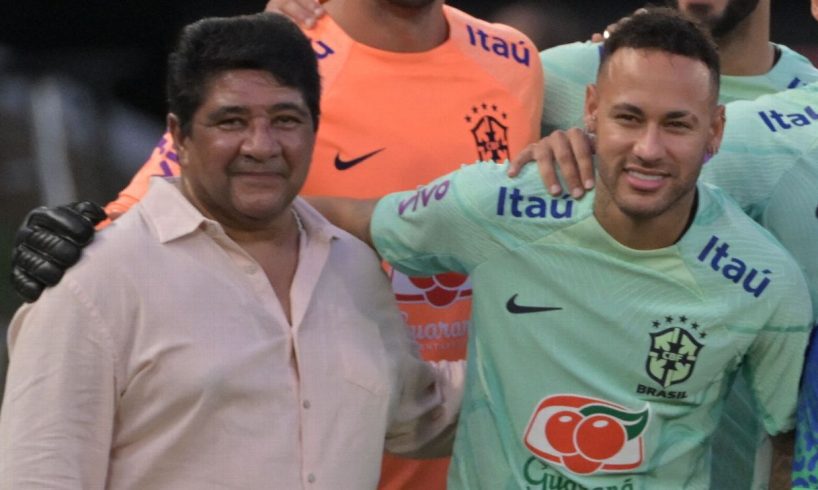
Tim Vickery, South America correspondentJan 8, 2024, 07:00 AM ET
As Brazil mourns the great Mario Zagallo, who died on Friday at the age of 92, the contrast becomes sharper between the days of past glory for the national team and the present-day administrative chaos.
The five-time men’s World Cup winners have made a stuttering start to their campaign to reach the 2026 tournament. They have lost three of their first six matches including their first-ever home defeat in a qualifier at the hands of neighbours and bitter rivals Argentina, a match which was marred by police clashing with fans.
All the while, they have been beset by turmoil at the CBF (Brazil’s football federation.) As the old phrase puts it, Brazil is not for beginners, and the recent events need careful explanation.
– Stream on ESPN+: LaLiga, Bundesliga, more (U.S.)
Wasn’t Carlo Ancelotti meant to be coming in as coach?
No, that ship has sailed. CBF president Ednaldo Rodrigues had hoped that Real Madrid boss Ancelotti would take over the national team for the summer’s Copa America in the middle of the year, with the deal to be confirmed this month when the Italian entered the last six months of his contract at the Bernabeu.
But on Dec. 7 a courtroom coup removed Rodrigues from his position due to irregularities in his election last year. His authoritarian manner has made him enemies, and the awful 2023 for the national teams on all fronts led to the knives being sharpened. And so at this point Rodrigues was out, so there was no one to offer Ancelotti the job and no guarantee that the next president would want him — there has been considerable resistance in Brazil to the idea of a foreigner taking charge of the national team.
If there was any chance of Ancelotti coming, it disappeared at that moment. He had cannily kept his options open, and on Dec. 29 he agreed another two-year deal with Real Madrid.
Editor’s Picks
2 Related
So who’s in charge of the CBF now?
Ednaldo Rodrigues.
You’re going to have to explain that one.
On Jan. 4 he was reinstated by Supreme Court judge Gilmar Mendes.
So he has ridden through the storm?
No, not at all. Mendes did not judge the merits of the case. His was purely a temporary decision, borne out of necessity. Jan. 5 was the deadline for teams to send in their squad lists for the 2024 Olympic qualifying tournament, which gets underway in Venezuela on Jan. 20. The signature of the president was needed on the squad list. Brazil had no one to sign. Mendes therefore ruled that the CBF was being harmed by not having a president, and so Rodrigues was brought back, but not on a definitive basis.
The decision to oust Rodrigues was taken and upheld at all three levels of the Brazilian legal system, and next month a full session of the Supreme Court will meet to discuss and rule on the merits of the case.
So Rodrigues is effectively a stand-in?
Yes, he is a stand in for himself, if that makes any sense.
Not really. He’s not acting like a stand-in, is he?
No, he’s taking a lot of definitive decisions. He sacked Fernando Diniz, the coach who was meant to be keeping the seat warm for Ancelotti. Diniz was due to have been in charge for the March friendlies against England and Spain, but now he goes back to being exclusively the coach of reigning South American champions Fluminense.
With Brazil down in sixth place after the first six rounds of World Cup qualifiers, the double-function of Diniz clearly has not worked. Rodrigues is closing a deal with São Paulo coach Dorival Júnior to take over the national team. São Paulo have announced that he is leaving, and Júnior has said “it is the realisation of a personal dream” to coach Brazil, but the appointment has not yet been announced by the CBF.
This, of course, is very strange. Rodrigues is taking important decisions with the flimsiest of mandates and could easily be out of a job next month. This can either be seen as an example of the kind of authoritarian behaviour which has made him so unpopular and led to legal measures being taken against him, or it could be viewed as a quest to acquire popularity, since Dorival Júnior had become a rallying point for those opposed to the idea of a foreign coach.
Ednaldo Rodrigues (left) remains in charge of Brazil’s football federation on a temporary basis, but uncertainty remains over his future. NELSON ALMEIDA/AFP via Getty Images
How has FIFA taken all of this?
With a certain perplexity. A FIFA commission is in Brazil, and this week it will have talks at the CBF with a view to attempting to sort out the situation. There was a genuine problem before Rodrigues was reinstated. The Rio de Janeiro courts appointed lawyer Jose Perdiz to take charge of the CBF on a temporary basis until elections were called. FIFA demanded that no elections take place until the visit of its commission and it did not recognise Perdiz, as world football’s governing body takes a dim view of government interference in football associations. But there is a complication.
Of course there is. Go on.
Brazil had looked in pole position to host the next Women’s World Cup in 2027. The choice will be made by May, meaning that this is the worst possible time for the CBF to be a riderless horse. And staging such an event requires considerable government support and involvement. The government will surely have some kind of role in the discussions taking place with FIFA over the next few days. It could be significant that the request to reinstate Rodrigues came from the Brazilian Communist Party, which forms part of the governing coalition, and was also supported by the country’s Attorney General.
So the Women’s World Cup could be the most important part in the whole story?
Very possibly. Although it boils down to a test of the popularity of Rodrigues, the case itself is full of technicalities. In a country the size of a continent, what should be the respective weight in voting of the state federations vis a vis the clubs? The Ancelotti situation has come and gone. The area where this affair could have clear and comprehensible ramifications is on Brazil’s bid to host 2027.
South Africa was seen as the big threat, but has withdrawn to focus on 2031. The other candidates are the United States, which is hosting the men’s tournament in two years’ time and doesn’t need to host another major championship, and a joint bid from Germany, Belgium and the Netherlands — three nations which are next to France, the host nation in 2019.
Brazil’s bid is not only much more interesting, it is cheap — the major investments were all made for the men’s World Cup a decade ago. And it is important. Staging the competition will give visibility and momentum to a sport which would have developed quicker had it received more attention in the early years of the century.
At one point, Brazil were close to being considered the best team around but have since slipped back. Hosting a World Cup could help them get back on track in both the short- and long-term. These are vital months when people within FIFA need to be convinced of the merits of Brazil’s bid, and the quality of those who will form the local organising committee.
Brazil has a real opportunity, and it would be a dreadful waste if this was thrown away as a consequence of political infighting.






